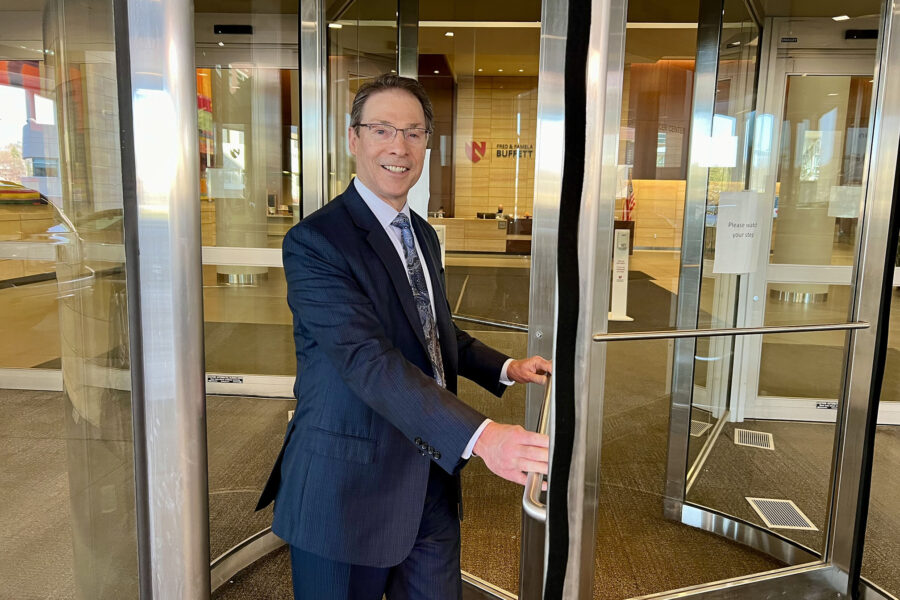Preparing for accreditation is daunting, exacting, stressful, vital. It’s no wonder then, that for most universities and colleges, it’s an event that typically occurs every eight to 10 years. But for the UNMC College of Allied Health Professions, which boasts 15 health professions programs and a host of other online degrees and certificates (in conjunction with UNMC Graduate Studies), accreditation is a continuous process.
Kyle Meyer, PhD, dean of the college, has likened it to a perpetual revolving door. Tammy Webster, PhD, associate dean for academic affairs in the UNMC College of Allied Health Professions, prefers a baseball or softball metaphor:
“There is aways a program up to bat,” she said, “and one or two programs on deck.”
And these are crucial at-bats, Dr. Webster said:
“Seeking and maintaining programmatic accreditation is an essential component to ensuring the quality of our programs and remaining competitive for applicants,” she said. “We celebrate each accreditation award with tremendous pride and then immediately start preparing for the next site visit.”
Accreditation of UNMC and its colleges and educational programs is the procedure through which independent agencies validate standards and processes to ensure students are properly prepared to enter their professional fields of choice. It is not an exaggeration to say that accreditation is the regulatory life blood for academic medical centers.
Institutional accreditation examines the policies, practices and resources of an entire university and, in the case of UNMC, is conducted through the Higher Learning Commission. Specialized or programmatic accreditation, on the other hand, is specific to a given college or profession. Meeting programmatic accreditation standards ensures both students and the public that the program has the commitment, budget, resources, contemporary curriculum, faculty and, in the case of recurring accreditation, the outcomes that ensure students receive the educational experience necessary to perform the expected responsibilities of their profession upon graduation.
The College of Allied Health Professions, like all UNMC’s colleges, recognizes the value of specialized or programmatic accreditation for its programs, students and the public. Fourteen of its programs participate in specialized accreditation. As such, the college interacts routinely with nine separate programmatic accreditation agencies (some agencies accredit more than one program).
The maximum award length from agencies accrediting allied health programs is typical of agencies accrediting other UNMC colleges – usually seven to eight years. But because the college has so many programs, and very few are on the same accreditation cycle, while other UNMC colleges host a site visit once every eight years, the UNMC College of Allied Health Professions hosts one or more accreditation site visits annually. For example, over the past 10 years, the CAHP has hosted 15 site visits. Due to delays caused by the pandemic, the college had seven site visits in 2023 alone.
“Accreditation self-studies and site visits are just part of our annual life cycle, due to the nature of having multiple constituent programs,” Dr. Meyer said. “Because we do it so often, and so well, there’s a tendency to take our success for granted. But when you consider that all our programs have been continuously accredited throughout the history of the college, what we do as part of our ‘routine’ operation is really quite remarkable.”
“It is a credit to the faculty, staff, students and clinical preceptors of our CAHP programs,” said Dele Davies, MD, senior vice chancellor for academic affairs. “Preparing for accreditation is tremendously important and time-consuming work. That the CAHP has done it consistently with excellence is a testimony to the college’s commitment to the process and to UNMC.”
In late March, the Doctor of Occupational Therapy program was the college’s latest program to be awarded full accreditation by the Accreditation Council for Occupational Therapy Accreditation for the maximum seven-year period. “The UNMC and CAHP administration is committed to the process of accreditation, addressing quality and integrity of programs for the benefit of learners and the communities they serve,” said Nancy Krusen, PhD, director of the OTD program.
“Whenever I think about accreditation in the CAHP, I’m reminded of an old movie titled, ‘If It’s Tuesday, This Must be Belgium,’” Dr. Meyer said. The movie chronicles the lives and adventures of a group of tourists on a European sightseeing tour of nine countries in 18 days. “While we don’t quite keep that pace, I sometimes think that title is an apt description for the ongoing accreditation work in the CAHP.” The physical therapy program currently is preparing its self-study in advance of a site visit in spring 2025.
For more information on the accreditation agencies for all of UNMC Colleges, visit the Academic Affairs Accreditation Website at this link.

Thanks to the top notch leadership of our deans and program directors this is possible and also well done!